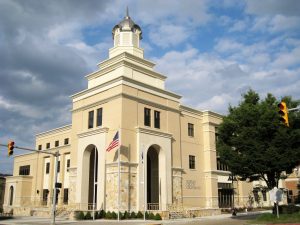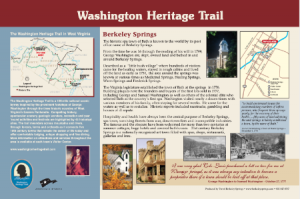
Town of Bath
 There are several Washington Trail sites in the historic spa town of Bath, known to the world by its post office name of Berkeley Springs.
There are several Washington Trail sites in the historic spa town of Bath, known to the world by its post office name of Berkeley Springs.
By 1750, there was a thriving community around the warm springs as hundreds of health seekers followed Native American tales and came to “take the waters.” Early travelers described it as a “little bush village” where hundreds of visitors came for the healing waters, stayed in rough cabins and lived off the land. Writing of his first visit in 1748 as a teenage surveyor, George Washington called them “ye fam’d warm springs.”
The area around the springs was known at various times as Medicinal Springs, Healing Springs, Warm Springs and Frederick Springs. On December 6, 1776, the Virginia legislature established a town at the springs for the express purpose of caring for health seekers, a tradition that continued over the centuries through cycles of fashion and notoriety. Today, hospitality and health are still prized. There are three full service spas, dozens of lodging businesses, award-winning restaurants, and an unsurpassed collection of unique shops, most within walking distance of the springs.
County seat of today’s Morgan County, the official name of this historic town is Bath, given when Washington, his family and friends established it around the warm mineral springs as the country’s first spa. They had high hopes for their spa town. Today, the name of Berkeley Springs given by the Virginia postal system in 1802 is universally used.
Building plaques note the founders and buyers of the first lots sold in 1777 including George and Samuel Washington as well as three signers of the Declaration of Independence and Constitution, two Revolutionary War generals and a half dozen members of the Continental Congress. The colonial elite clearly selected Bath as the country’s first spa. After more than two centuries, Berkeley Springs is one of the only noted 19th century Blue Ridge spas still thriving.
In 1778, General Daniel Morgan brought Hessian prisoners of war to the Berkeley Springs area where some were hired out as farm labor.
More recently, artists have been attracted to Berkeley Springs earning it the distinction of being one of only 11 towns listed in all four editions of “The 100 Best Small Art Towns in America.” A community gallery as well as art performances and classes are presented at the Ice House a former apple cold storage building now used as an art center.
Travelers reach Berkeley Springs today on US 522 south from I-70 or north from Winchester, VA and I-81. Rt. 9 is the east-west route through the Eastern Panhandle and it intersects US 522 in downtown Berkeley Springs.
George Washington visited the warm springs nearly a dozen times with various members of his family often staying for several weeks. He came for the waters as well as to socialize.
“The place I am told, and indeed have found it is already, is supplied with provisions of all kinds — good beef and venison, fine veal, lamb, fowl and all may be bought at almost any time; but lodging may be had on no terms but building them, and I am of the opinion that numbers get more hurt by their manner of lying, than the waters can do them good. Had we not succeeded in getting a tent and marquee from Winchester, we should have been in a most miserable situation here.”
Washington’s letter to Reverend Charles Green – August 26, 1761.
There are still many good things to eat in Berkeley Springs with more than a dozen restaurants serving a variety of food for a range of prices. In contrast to Washington’s complaints about no lodging, contemporary Berkeley Springs offers an alluring array of places to stay from a country inn next to the park to a number of B&Bs in historic houses.
On November 6, 1776 the Virginia legislature received a petition from about 250 local residents at the warm springs, dated August 15, claiming that more than 700 persons have been at the springs at one time. These people, “afflicted with various disorders, received much benefit from the use of the water.” The petition stated that Lord Fairfax, owner of the springs and surrounding area had repeatedly denied people the right to build “proper buildings for the reception of company. This lack of lodging subjected people to many inconveniences, and the poor and more indigent suffer the greatest distress, not having shelters to save them from the inclemency of the weather.” In addition to serving the poor and diseased, the petitioners claimed that a town around the springs would increase public attendance and business there.
On December 6, the legislature acted on the petition and passed an act for establishing a town at the Warm Springs in the county of Berkeley.
“Whereas it hath been represented to this general assembly, that the laying off fifty acres of land in lots and streets for a town at the Warm Springs, in the county of Berkeley, will be of great utility, by encouraging the purchasers thereof to build convenient houses for accommodating numbers of infirm person, who frequent those springs yearly, for the recovery of their health:
Be it therefore enacted by the General Assembly of the commonwealth of Virginia, that fifty acres of land adjoining the said springs, being part of a larger tract of land, the property of the right honorable Thomas Lord Fairfax to be laid out into lots of one quarter of an acre each, with convenient streets, and the same is hereby established a town, by the name of Bath.”

